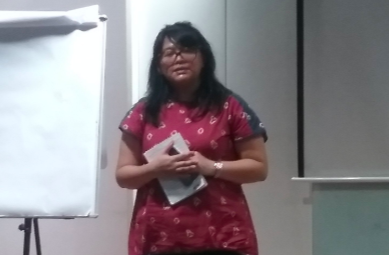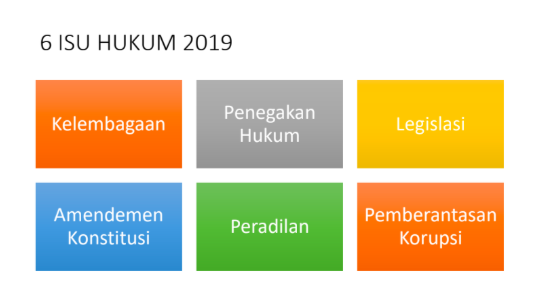The year 2019 was loaded with political elements: from the simultaneous national and regional elections, transitions of leadership, to the massive protests by the end of the year. On Thursday, 19 December 2019 The Center for Legal and Policy Studies (Pusat Studi Hukum dan Kebijakan or PSHK Indonesia) hosted an FKP seminar discussing the year in review.
Fajri Nursyamsi (PSHK Indonesia) began the seminar by stating the issues to be discussed, which are institutions, law enforcement and legislation, amendments to the constitution, the judiciary system, and the eradication of corruption. Regarding institutions, Fajri explained how the contestation between political parties was unsuccessful in creating a parliament that represents the diversity of the Indonesian society due to the high political costs. The post-election consolidation efforts also ended up strengthening the oligarchs, due to the nonexistence of a balancing opposition. As a result, the people ended up being the opposition.
On the subject of law enforcement, Fajri believes that the state became more repressive as the nation’s elites become more consolidated to secure their interests. President Joko Widodo’s administration also did not success in actualizing their commitment in resolving past human rights violations (e.g. Munir’s alleged assassination and the violence against Novel Baswedan). In addition, violations of the freedom of expression and the rights to assembly were rampant during the year. There were also cases of violence, casualties, as well as material and immaterial losses done by the law enforcement apparatus
In terms of law legislation, there were a number of rejections of proposed bills, such as the Criminal Code, KPK, Land, and Correctional Facilities bills due the contents which were criticized as discriminatory and have the potentials of igniting human rights violations. The government’s efforts of regulation reform in 2019, for example the formulation an Omnibus Law, were also problematic. There has also been some backlash on the plan to amend the Indonesian Constitution for fear that it brings out practices that were common during Orde Lama and Orde Baru.
In 2019, the Supreme Court and the Constitutional Court issued a number of policies to improve access to justice using a technological approach to improving services in the judiciary system. However, procedural improvements were done without improvements in the integrity of human resources. Fajri believed that in the future, the judiciary system needs to play a corrective role for the regulations produced by the president and the parliament. To do this, it is essential to improve the integrity of the human resources to create an accountable and transparent system.
Lastly, the anti-corruption movement faced a big challenge as the oligarchs showed efforts to weaken the Commission of Corruption Eradication (KPK) in 2019. The political will has also been low in strengthening the KPK, as seen from the efforts to revise the law on Correctional Facilities which regulates remission policies that are now easier to obtain by corruptors.
Moving forward, Fajri called for the strengthening of the people’s movement to control every government policy. The government must also open a space for public participation in the formulation of regulations and policies, and abandon the repressive approach in law enforcement.
For the complete presentation and Q&A session, please refer to the video and materials provided.







